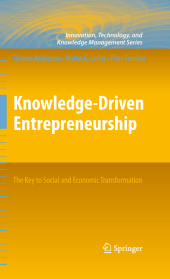 Neuerscheinungen 2012Stand: 2020-01-07 |
Schnellsuche
ISBN/Stichwort/Autor
|
Herderstraße 10
10625 Berlin
Tel.: 030 315 714 16
Fax 030 315 714 14
info@buchspektrum.de |

Thomas Andersson, Martin G. Curley, Piero Formica
(Beteiligte)
Knowledge-Driven Entrepreneurship
The Key to Social and Economic Transformation
Repr. d. Ausg. v. 2010. 2012. xxii, 254 S. 30 SW-Abb. 235 mm
Verlag/Jahr: SPRINGER, BERLIN 2012
ISBN: 1-461-42526-3 (1461425263)
Neue ISBN: 978-1-461-42526-7 (9781461425267)
Preis und Lieferzeit: Bitte klicken
This volume examines the crucial role of societies to educate and support entrepreneurs and establish the right environment for new business development and rapid conversion of ideas into enterprises that contribute to economic growth and prosperity.
The Springer book series Innovation, Technology, and Knowledge Management was launched in March 2008 as a forum and intellectual, scholarly "podium" for global/local, transdisciplinary, transsectoral, public-private, and leading/"bleeding" -edge ideas, theories, and perspectives on these topics. The book series is accompanied by the Springer Journal of the Knowledge Economy, which was launched in 2009 with the same editorial leadership. The series showcases provocative views that diverge from the current "conv- tional wisdom," that are properly grounded in theory and practice, and that consider 1 2 the concepts of robust competitiveness, sustainable entrepreneurship, and demo- 3 cratic capitalism, central to its philosophy and objectives. More specifically, the aim of this series is to highlight emerging research and practice at the dynamic intersection of these fields, where individuals, organizations, industries, regions, and nations are harnessing creativity and invention to achieve and sustain growth. Books that are part of the series explore the impact of innovation at the "macro" (economies, markets), "meso" (industries, firms), and "micro" levels. (teams, indi viduals), drawing from such related disciplines as finance, organizational psychology, research and development, science policy, information systems, and 1 We define sustainable entrepreneurship as the creation of viable, profitable, and scalable firms. Such firms engender the formation of self-replicating and mutually enhancing innovation networks and knowledge clusters (innovation ecosystems), leading toward robust competitiveness (E.G. Carayannis, International Journal of Innovation and Regional Development, 1(3), 235-254, 2009).
Scenario setting.- Foundation laws of knowledge dynamics.- The knowledge value chain.- Industry and knowledge clusters.- Embracing business ecosystems to change the mindset.- Corporate management of knowledge.- Knowledge-relevant economic policy.- Global advance of the knowledge economy.- The entrepreneurial revolution.- Types of entrepreneurs.- Entrepreneurial and corporate universities.- Small business and entrepreneurial growth companies.- Native and international entrepreneurship.- Laboratory experiments as a tool in empirical economic analysis of high-expectation entrepreneurship.


